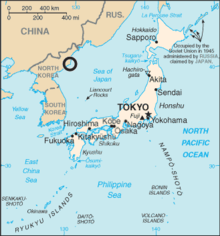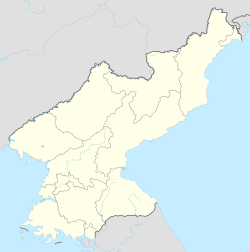Tonghae Satellite Launching Ground
| Tonghae Satellite Launching Ground | |

Circle locates North Korea Tonghae Satellite Launching Ground (previously Musudan-ri) within the Sea of Japan
|
|
| Korean name | |
|---|---|
| Chosŏn'gŭl | 무수단리 |
| Hancha | 舞水端里 |
| Revised Romanization | Musudan-ri |
| McCune–Reischauer | Musudan-ri |
| Tonghae Satellite Launching Ground | |
|---|---|
| 무수단리 | |
| North Korea | |
| Coordinates | 40°51′00″N 129°40′00″E / 40.85°N 129.666667°E |
| Site history | |
| Built | 1980s |
| Built by | North Korea |
The Tonghae Satellite Launching Ground, also known as Musudan-ri, is a rocket launching site in North Korea.
It lies in southern Hwadae County, North Hamgyong Province, near the northern tip of the East Korea Bay. The area was formerly known as Taep'o-dong (대포동) during the period when Korea was occupied by Japan, and the Taepodong rockets take their name from this. This single loose-surface road is susceptible to seasonal flooding. The site is 45 km northeast of port city of Kimchaek and 45 kilometers (28 miles) from the town of Kilju (길주읍). There is a small wharf located at the fishing village of Tongha-dong but can only accommodate vessels smaller than 40 meters in length.
By the early 80s, North Korea needed a flight-test facility for its program to reverse-engineer and produce copies of the Scud-B which it acquired from the Soviet Union in the late 60s. Previously, North Korea used a facility at Hwajin-ri (華進里), Pyongwon-kun, South Pyongan Province to test for anti-ship missiles and probably FROGs, surface-to-air missiles (SAMs) and other rockets. However, Hawjin-ri had insufficient range for the Hwasong-5, which would enter Chinese territorial waters during a test. The construction of the facility continued off and on throughout the 1980s and 1990s. Construction was made by the 117th Regiment under the Air Force Construction Bureau (空軍建設部) of the Ministry of People's Armed Forces. Construction of the launch pad was completed in 1985. During the early stage of construction, the site had an extremely rudimentary infrastructure, such as a few roads, a command bunker, a radar facility, and modest storage and support facilities.
...
Wikipedia

